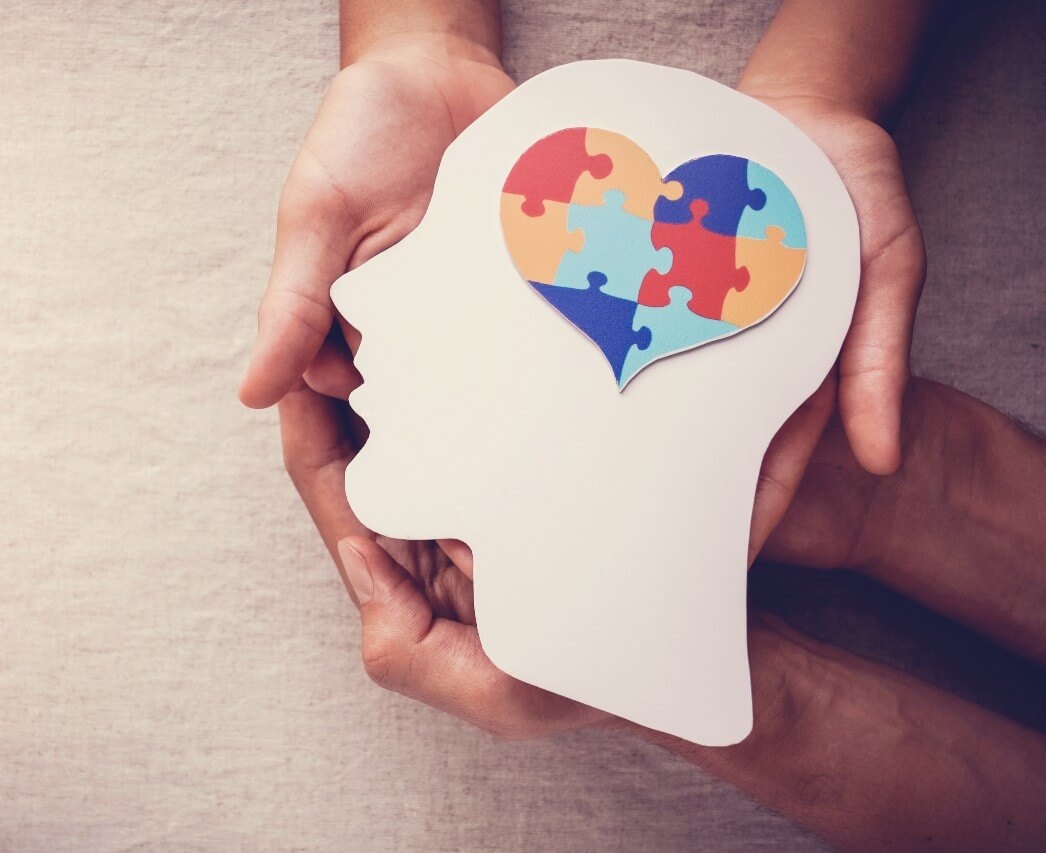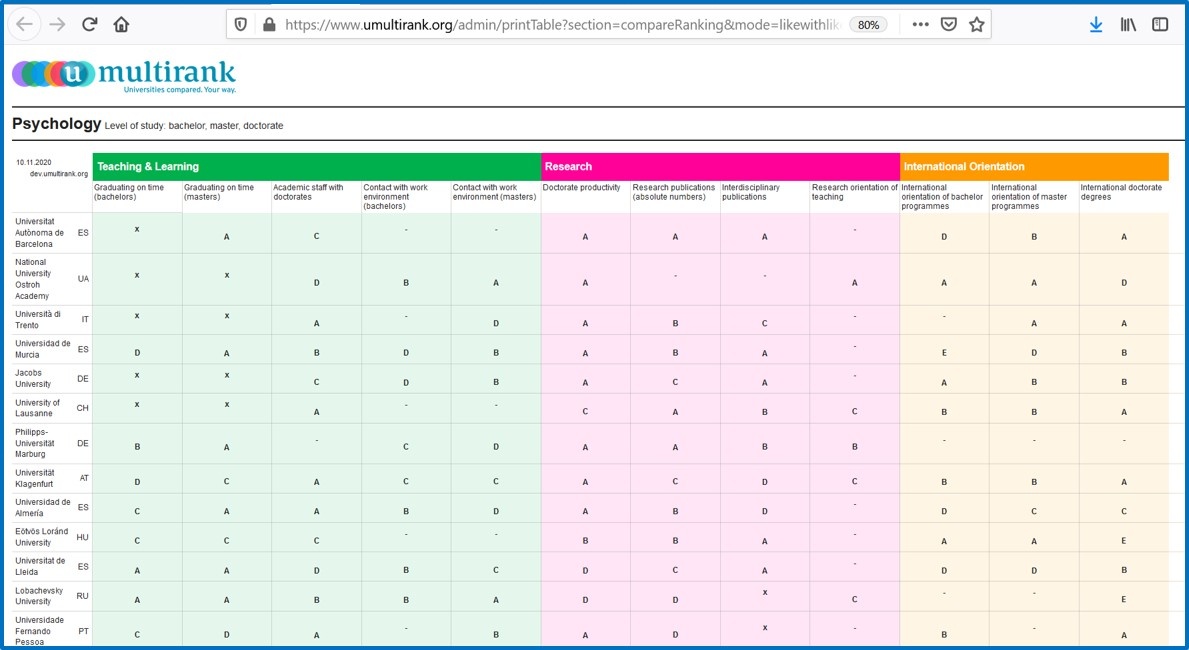Caring for your mental health during the COVID-19 pandemic
Valentin Schinnerl and John Roman, U-Multirank
Nov 11, 2020 10:44 (CET)

Mental health is an important, yet often neglected part of our wellbeing. Even with efforts like, World Mental Health Day – a day for global education, sensitisation and awareness against social stigmatisation of people with mental diseases – mental health continues to be an often ‘forgotten’ topic. Ones physical health can be more easily recognisable when dealing with our well-being, but so often they affect one another.
Even today, those suffering with mental health problems are often stigmatised and the topic is dismissed as something taboo. This stigmatisation in turn makes people shy away from addressing mental health problems, or even seeking out help. In response to COVID-19, the World Health Organization conducted the first global survey on the impact of the pandemic on mental health around the world. ‘Although 89% of countries reported in the survey that mental health and psychosocial support is part of their national COVID-19 response plans, only 17% of these countries have full additional funding for covering these activities.’ These figures show a need for additional resources and support in caring for our mental health.
To help you with your journey to a healthier wellbeing, this blog post will provide information about mental health and give tips on what to look out for and what to do. Keep in mind these are only recommendations, and those with urgent mental health needs should seek out professional support.
What can I do to care for my mental health?
10 Tips for caring for your mental health during the COVID-19 pandemic:
-
Reflect on your feelings (when and why)
Sadness is a common and normal feeling to experience. But if you start to pay attention to when and why you feel this way you might be able to see a pattern. Take the time to find out what you feel and when you feel it. This will not only help you to classify your feelings better in the future, but also remind you in dark hours that you have felt this way before and that you have been able to get through these negative emotions. Meditation can help you because you can concentrate on yourself through special techniques. Free your head from stormy thoughts, breathe in and out and deal with the subject of mindfulness. Get to know yourself and ask yourself what is on your mind and how you can deal with it. Yoga also offers you a lot in this area - you occupy yourself with your body, with your breathing and create a well sportive balance.
-
Allow yourself to feel your feelings
It is quite normal to show emotional reactions - whether you feel happy, overwhelmed, stressed, anxious or sad. There is no reason to suppress your feelings - it can even help to express them openly. The organisation, Mental Health Europe advises: Allow yourself these feelings and try not to ignore or suppress them. It can help some people to record their feelings in a diary, talk to others about them, process them through creative activities or meditate regularly.
-
Find communities where you can share about yourself
Problems and pain need not be solved by one person but can be shared. Find the courage to open yourself to friends or family. They can offer you a safe space where you can be who you are. You may be able to go one step further and find the courage to commit yourself outside your comfort zone.
Are there communities, clubs or organisations you want to get involved in? They can give you a feeling of appreciation and acceptance. As a valuable part of a community, we are not only partakers, but also givers. In this way, a common we is created from many individuals.
-
Accept yourself
Accepting yourself seems easier than it actually can be. To accept oneself means to stand by ones abilities, to be able to name them and to know what makes one happy. Listen to the signals and feelings your body gives you. These can be helpful in showing you what is important for you and can also help you to recognise and accept/ work on any areas you’d like to change.
Through this process you may also find out what makes you happy. Write a list of things that make you happy and update it regularly.
-
Get active
A healthy mind also includes a healthy body. Pay attention to your sleep rhythm, your food and exercise routines. The nice thing about these points is that they are mutually dependent on and support each other. A healthy sleep as well as a good nutrition is an important step in the right direction. If you are not very hungry or have problems falling asleep, you can counteract this with exercise. Whether it's yoga, jogging or a home-workout, find your individual sport routine.
-
Am I suffering from FOMO?
FOMO (fear of missing out) is a term we encounter more and more often. It describes a feeling that makes us want to participate in as many activities, trainings and get-togethers as possible because we are afraid of missing something important. This fear takes control of our priorities and we no longer choose what is really important to us. This circumstance costs us a lot of energy and robs us of the pure feeling of happiness and satisfaction. We don't give ourselves time to process the experiences, which results in permanent mental stress. Reflect on important things and ask yourself if you really miss something when you give your mind time to process your experiences.
-
Work-Life-Balance - Quality time
Make sure you have a healthy balance between your working hours and your free time. It is not always easy to switch off and free your mind from thoughts about school or work – especially during a global pandemic. Set yourself simple goals that you can pursue - for example, don't check your emails before go to sleep. Take time for the outdoors and activities with your loved ones (virtual hangouts are much more common during the pandemic) and prioritise your own health. Find your own way to be happy - there is no such thing as a ‘one-size-fits-all’ when it comes to work-life balance.
-
Set social media boundaries for yourself
Regulate your social media consumption - Instagram and Facebook can quickly become unhealthy habits if you don't limit your time there. Set a certain daily or weekly limit and spend the rest of your time during other activities.
Set yourself a personal limit for news about COVID-19, because: Constant waiting for news and constantly renewing the social media feed can increase worries. Consider for yourself whether an occasional conscious ‘news break’ would do you good. The World Health Organization (WHO) also recommends that you stick to factual information, which involves practical steps for preparation and protection.
-
Teletherapy… Are there digital support services available regarding mental health?
Seeking help isn’t a sign of weakness, on the contrary it is an act of strength and there are people who want to help you if you confide in them. It also means trust and changes the perception of your own helplessness. In Corona times a personal consultation can sometimes be difficult. But some have already reacted to our current climate and offer video consultation hours. In addition, the digital world offers many possibilities that support mental health. Inform yourself and take advantage of those opportunities. Always remember that the pandemic is also passing by again - a positive attitude can help your mental health and protect you in times of great uncertainty.
-
How can being creative help me?
Through creative activity you can express impressions that you cannot put into words - be it longings, thoughts or fears. Through creative design we can find a balance for the inner tensions. Many people describe making music or painting as particularly relaxing and experience these activities as a personal source of strength.
A shortage of mental health experts | Study Psychology
With many countries around the world suffering from a shortage of mental health experts, it may at time be difficult to find the help and support you need. ‘[The World Health Organization’s] Mental Health Atlas 2017 reveals that although some countries have made progress in mental health policy-making and planning, there is a global shortage of health workers trained in mental health and a lack of investment in community-based mental health facilities.’ With the increased need of mental health workers during COVID-19, more and more people are studying Psychology. If understanding the human mind, and helping people seems to be up your alley, then maybe psychology is the perfect study subject for you.

U-Multirank provides information on more than 200 universities and colleges around the world offering psychology as a study subject. Learn about studying psychology and compare programmes today via our website.




